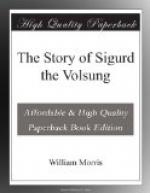Then cometh an elder of days, a man of the ancient times,
Who is long past sorrow and joy, and the steep of the bale he climbs;
And he kneeleth down by Sigurd, and bareth the Wrath to the sun
That the beams are gathered about it, and from hilt to blood-point run,
And wide o’er the plain of the Niblungs doth the Light of the Branstock
glare,
Till the wondering mountain-shepherds on that star of noontide stare,
And fear for many an evil; but the ancient man stands still
With the war-flame on his shoulder, nor thinks of good or of ill,
Till the feet of Brynhild’s bearers on the topmost bale are laid,
And her bed is dight by Sigurd’s; then he sinks the pale white blade
And lays it ’twixt the sleepers, and leaves them there alone—
He, the last that shall ever behold them,—and his days are well nigh done.
Then is silence over the plain; in the
noon shine the torches pale
As the best of the Niblung Earl-folk bear
fire to the builded bale:
Then a wind in the west ariseth, and the
white flames leap on high,
And with one voice crieth the people a
great and mighty cry,
And men cast up hands to the Heavens,
and pray without a word,
As they that have seen God’s visage,
and the voice of the Father have heard.
They are gone—the lovely, the
mighty, the hope of the ancient Earth:
It shall labour and bear the burden as
before that day of their birth.
* * * * *
Ye have heard of Sigurd aforetime, how
the foes of God he slew;
How forth from the darksome desert the
Gold of the Waters he drew;
How he wakened Love on the Mountain, and
wakened Brynhild the Bright,
And dwelt upon Earth for a season and
shone in all men’s sight.
Ye have heard of the Cloudy People, and
the dimming of the day,
And the latter world’s confusion,
and Sigurd gone away.
THE END
GLOSSARY
ABBREVIATIONS:—n., noun; n., verb; cf., compare; e.g., for example; p.t., past tense; p.p. past participle.
Abasement, casting down, defeat.
Acre-biders, peaceful workers in the fields as distinguished from warriors who left their homes to go to war.
Amber, a yellow substance found on the shores of the Baltic Sea and used from very early days as an ornament. The “southern men,” or traders from the shores of the Mediterranean, came north to buy it.
Ark, a box for treasures.
Atwain, in two pieces, e.g. “The sword ... had smitten his body atwain.”
Avail, n. power; n. to have power, to succeed.
Bale, disaster, destruction, death; a great pile of wood for burning.




